[one_half padding=”0 0 0 0px”]
Beretta ARX100
[/one_half]
[one_half_last padding=”0 0 0 0px”]
[/one_half_last]
Editor’s note: when Beretta launched the ARX100, we put up a spontaneous review. We had only had the gun for a few hours before press time. So we’re going back and taking another look at the rifle. This time Tom McHale has had more time to really push the gun. Here’s what he’s found:
If you made me describe one thought about the Beretta ARX100, it would be something along the lines of “ambi-flex-trous.”
Yes, you can easily reconfigure this rifle in all sorts of ways, which we’ll discuss in a minute, but the interesting thing is you can do all of it with a bullet. Macho, isn’t it? So far, I have yet to use a single tool of any kind for reconfiguration. Well, there was one exception. I did need a wrench to remove the factory flash hider, but I don’t think that counts as it doesn’t fall into the category of routine maintenance. Don’t tell the Beretta folks I applied wrenches and a bench vise to their loaner rifle, OK?
Let’s take a closer look.
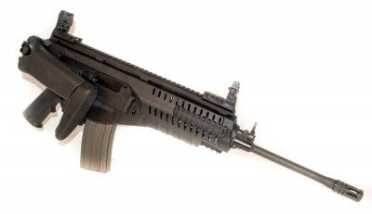
As the ARX100 is a piston-operated rifle, there’s no buffer tube to prevent a folding stock. It shoots in this configuration too.
The ARX100 looks large and potentially heavy, but it’s not. Judicious use of polymer keeps weight down and unloaded, it tips the scales at just 6.8 pounds. While the stock appears monolithic in design, it breaks into an upper and lower receiver, although the dividing lines are different than the upper and lower components of an AR rifle.
The butt stock is connected to the upper receiver half through use of a hinge, which allows the rifle to operate like a pistol. While the intent is easier transport, shooting with a folded stock feels very Buck Rogers. Since the rifle is piston operated, there’s no buffer tube in the way of pistol operation. The butt stock itself has four different positions to adjust length of pull.
The rifle is covered in web sling attachment points. A rotating swivel is in front of the gas block. The butt has a web sling loop. There are two flat sling loops on each side of the receiver for a total of six.
Rails are also abundant. The entire top surface of the rifle is a continuous rail, so there is no “joint” between receiver rail and forend rail as with an AR rifle. Four-inch rail segments are located up front in the three and nine o’clock positions. There’s a 1 ½ inch rail segment on the bottom in front of the forend cover. If you need to attach a 40mm grenade launcher, remove the lower cover and you’ll find a proprietary rail segment for this purpose. Because military-style rifle. Word is that Beretta may offer a Picatinny adapter at a later date.
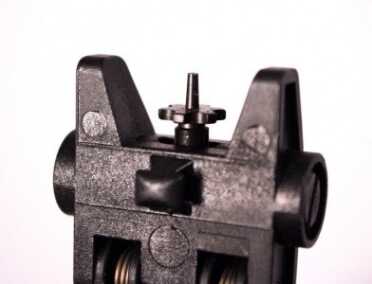
It comes with non-standard height sights. They’ll get you going, but may not co-witness with your optic.
The ARX100 comes with polymer flip up sights so you can shoot it out of the box. The front sight features a standard, height-adjustable post while the rear has a rotating aperture dial where apertures are calibrated for ranges of 100 to 600 meters. Be aware that these sights are taller than standard AR models, so they may not co-witness as you like. No worries, by pressing a button on each, you can slide them right off the rail if you don’t want them present.
The trigger is all military all the way. It’s big and wide, set in an oversized trigger guard for easy access with gloves. The pull weight leaves something to be desired, measuring 8 1/2 pounds for me, but at least it was smooth and not gritty. The trigger components are held in place by pins, so assuming demand is there, aftermarket companies like Timney should be able to offer replacements.
Ambidexterity
Bolt release and hold open
There are four ways to hold the bolt open on the Beretta ARX100. First, the bolt will lock back, as expected, on an empty magazine. Second, there is a button on the bottom side of the trigger guard that, when pushed up, engages the bolt catch. For options three and four, levers on the front sides of the trigger guard can be pushed up with your trigger finger to engage the bolt catch.
To release the bolt, you have three choices. As expected, you can pull the bolt handle back and let it fly. You can also push down on either of the trigger guard levers to release the bolt. The idea is to use your right or left trigger finger for this purpose.
Make sure to practice with this system to become acclimated. If you’re used to shooting standard AR-type rifles, you won’t want to be reaching for a bolt release button on the left side as you might drop a magazine. You also will want to train your fingers to find positions of the bolt release levers and magazine release levers, as they are about an inch apart on both sides of the receiver.
Safety
Two-position safety levers are already present on both sides of the receiver. Both are identical, so there is no built in favoritism of righties versus lefties.
Ejection
The ejection system is brilliant – and arguably redundant. The bolt has two extractors, right and left. A cross-bolt lever in the receiver blocks one, while allowing the other to operate. Depending on the position of the cross bolt, either the right or left extractor becomes live. Since ejection ports are open on both sides, you’ve just changed the ejection pattern. To operate the bolt, simply press a bullet tip into a hole behind the grip. The ejection system doesn’t care where which side the bolt handle resides, so choose your desired configuration and fling brass wherever you want. No need for field stripping or tools. While I chose not to break the eval rifle deliberately, I would think the system offers some redundancy. If one extractor breaks, simply flip the ejection system the other way to use the other one.
Magazine release
The magazine release button is located in the same position as on a standard AR-type rifle, just above the front of the trigger guard. The difference is that the magazine release button is not reversible as it doesn’t need to be. Buttons are already present on both sides of the receiver. No adjustment is required.
You might hear that pushing up on the bolt release levers will also release the magazine. On my current production evaluation sample, not so. Perhaps that was an earlier or Italian model feature not present on current US models.
Magazines and such
The ARX100 is designed to accept mil-spec AR magazines. And they do mean mil-spec. I tried several aluminum magazines and they all worked fine. Just for the heck of it, I tried a Magpul Gen M3 30 round magazine, not really thinking much of it, until the magazine wouldn’t seat. It appears that the ridges on the back spine of the Magpul, about 40% of the way down from the top, prevents the magazine from fully seating in the Beretta ARX100. Standard aluminum magazines have no such ridges, so nothing stops the magazine from seating slightly deeper in the magazine well than it would on a standard AR-type rifle. This got me curious, so I tried a couple of other Magpuls and a Troy Industries Battle Mag I had laying around. I found that PMAG Gen 2 and earlier don’t have the aggressive lip and worked fine. The Troy Industries magazine also works fine. While the texture begins at the same point as the PMAG Gen 3, the lip is subtle enough so it doesn’t get blocked by the ARX100 magazine well. The slightly deeper magazine well is just something to be aware of, especially if you have a supply of Gen 3 PMAGs.
Barrel removal, field stripping and bolt handle reversal
One of the nifty features of the ARX100 is the quick change barrel design. The end result is that you can change the barrel completely, in seconds, without any tools whatsoever. Over time, we might see conversion options for things like 300 AAC Blackout, 6.8 SPC and 7.62×39 – not to mention short barrels.
Even if you don’t ever want or need to change a barrel, removing it completely makes cleaning much, much easier. When you have such direct access, even getting into all the nooks and crannies of the barrel extension is a breeze.
Here’s how it works. The bolt handle has a maintenance position used for field stripping and/or barrel removal. Pull the bolt about ⅔ of the way back until it lines up with a mark on the receiver. Pull the bolt handle straight out until it locks into position. At this point, you can rotate the bolt handle forward right into ejection port area itself. That’s the maintenance position. While we’re talking about this, the same procedure is used to move the bolt handle to the opposite side – just keep pushing it right on through. Voila! It’s now on the opposite side.
Some folks aren’t happy with the relatively small bolt handle, but it’s small for this reason. It has to fit trough the ejection port to switch righty-lefty teams. The rumor mill is already buzzing about removable bolt handle covers that will provide a larger grip surface. The idea would be to remove the handle cover when you need to field strip the rifle.
Speaking of stripping, to field strip the rifle, you put the bolt in the maintenance position and fold the stock into the pistol position. Next, rotate the safety lever past “S” while pushing into the back of the receiver, now uncovered because the stock is folded. At this point, you can rotate the pistol grip out of the upper receiver and the major components come apart. It’s a lot easier than it sounds and requires no tools.
Got gas?
What generates more gas than a Mastiff that got into the sauerkraut leftovers? The itty-bitty .223 Remington cartridge, that’s what.
If it’s not already obvious, the Beretta ARX100 is a piston operated rifle. So, unlike a standard AR-type rifle where the mushroom cloud of burnt powder gusts into the receiver, the ARX vents it through a gas tube then out the door. As a result, it runs cool and clean when compared to standard direct impingement AR-type rifles. I think the open ejection ports on both sides help keep temperature moderated as well. Unlike a traditional AR, there is no dust cover over either ejection port and this provides another nod towards cool and clean operation.
Just in front of the forend, an adjustable gas block vents gas from the barrel up into the gas tube. The block features a rotating valve with two positions marked “N” and “S.” My initial guess as to the meanings, “Normal” and “Single shot” (possibly for suppressor use) was off the mark. Turns out “N” represents the non-standard, or adverse conditions, setting as it supplies extra gas to force reliable function in less than ideal conditions. The “S” setting is for standard use with normal power ammunition and clean conditions. I shot a variety of ammo, all on the “S” setting, and the system worked fine – no malfunctions.
The gas piston system is a bit unusual. The gas tube is covered by a captive piston cover that serves as a battering ram. When gas enters the tube, it pushes the exterior tube cover backwards and it Mike Tyson punches the snot out of the bolt carrier, so that the carrier begins its own backward travel. After case ejection, the recoil spring sends the bolt carrier forward, picking up the next cartridge in the process.
The gas tube and gas tube cover are captive to the barrel assembly, so when you remove the barrel for cleaning, you have access to all of it.
Silence!
At risk of getting into an embarrassing gunsmithing nightmare with the loaner gun from Beretta, I decided to remove the bird cage style flash hider and mount a suppressor. The factory flash hider does have a solid bottom (no bird cage vents) presumably to prevent dust from kicking up under the muzzle when the rifle is fired. The muzzle device is timed to the right position (solid side down) by use of a compression washer.
Anyway, I took the whole mess off, and as expected, the muzzle is threaded for standard ½ inch x 28 attachments. I had a SilencerCo Saker 556 on another rifle with a direct thread mount, so I moved it to the ARX for an afternoon of shooting.
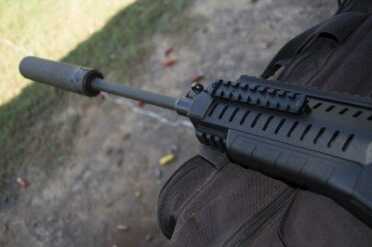
I mounted a SilencerCo Saker 556 just for kicks. It worked fine, but the combo resulted in a hot gas facial.
The Saker worked beautifully, regardless of the gas block setting (non-standard or standard) and I had no malfunctions as a result of wonky gas pressure changes caused by addition of the silencer. On the other hand, with each and every shot, regardless of gas pressure system setting, I got more than the normal face full of gas from the ejection ports on both sides. Most AR-type rifles have at least a hint of hot and powdery headwind, but the breeze from the ARX when shooting suppressed was more like a gale. After a couple dozen rounds with the suppressor mounted, I took it off, and washed my face.
Word on the street is that Beretta is working on a more silencer-friendly barrel and gas block as an option. Due to the quick barrel change feature, one would be able to swap a standard barrel with a suppressed barrel in seconds. We’ll keep an ear out on that front.
Shooting the ARX100
In the name of top-flight investigative journalism, I actually shot this rifle. A lot.
Also in the name of tenacious reporting, I tried all of the stated features to verify performance, even at the risk of life and limb. For example, while cranking off rounds, I switched ejection to the left side mid-magazine – just because I could. I thought it was good science, but the folks to the left of me on the shooting line apparently had less appreciation for my thorough reporting. Grumps. Needless to say, the ability to switch ejection at will was cool.
Earlier I mentioned the ease of completely removing the barrel. This is a neat administrative feature, but I was concerned about the rifle’s ability to hold zero through barrel changes. To find out, I shot a number of five shot groups at a target 100 yards down range. I used a Hawke Optics 3-9x Panorama scope so could be precise with my aim. I then removed the barrel and let everything cool down while I apologized for my reckless brass slinging during the ejection pattern tests. After a while, I remounted the barrel and re-shot groups. Guess what? No discernible change in points of impact. I thought that was cool. Clearly if you change barrel types, you ought to plan on a change in point of impact, but remounting the same barrel after cleaning or maintenance didn’t seem to matter.
I shot a variety of ammo types over several range outings and had no malfunctions of any kind. It was clear that I wan’t the first one to shoot this rifle, as it was dirty when I received it. I didn’t bother to clean it at first as I wanted to see how it ran with some fouling. No worries there.
I also did accuracy testing on a subsequent range trip. To rule out filthy bore issues, I did give that a scrubbing prior to accuracy tests. I used a Blackhawk! Sportster Titan III rifle rest and the Hawke Optics 3-9x optic. Here’s what I experienced shooting five shot groups at 100 yard targets.
American Eagle 55 grain FMJ: 2.30”
Black Hills 5.56mm 50 grain Barnes TSX: 1.00”
DoubleTap 55 grain Nosler Ballistic Tip: 1.02”
Freedom Munitions 55 grain FMJ, Remanufactured: 2.42”
Hornady 55 grain V-MAX: 1.09”
IMI 5.56mm 77 grain OTM, LR, Mod 1: 2.76”
Winchester Ranger 69 grain Match HPBT: 2.98”
I actually tried other heavier bullet loads in a less formal setting, and strangely enough, the 1:7 twist barrel still seems to prefer lighter weight bullets. Go figure. It just goes to show the importance of testing ammo in your specific gun to see what it likes best.
Impressions
The Beretta ARX100 is more flexible than an inebriated slinky. The military roots are evident as maximum brainpower has been dedicated to implementing features that will allow the widest array of shooters to use the rifle while also allowing near-limitless customization. You can do just about anything to this rifle without a single tool.
The ergonomic design is different than a typical AR-type rifle, and that’s OK. While some of the design goals included compatibility with existing ammunition, magazines and rail accessories, there were no such restrictions for functions like charging, bolt release, ejection and magazine release. Some of these things are different, by design.
Whatever you think of the new approaches to operation of the gun, you can’t deny the brilliance of engineering. As I took this gun apart, reconfigured and re-assembled it without tools, I was amazed at the clever thinking behind its construction and operation. When you start contemplating individual components, you’ll almost always find multiple purposes behind each and every design decision. The ejection system is a great example. Rather than make one extractor that can be moved, why not install two while using the inactive one as the ejector? The rifle is filled with these types of clever solutions.
Are there things I would want different? Sure. I like my PMAG Gen 3s. I’d want a better trigger. If I was gonna be really picky, I might want the ability to replace the grip with an aftermarket model. And I want less annoying function with a suppressor attached. According to rumor, some of these issues are already being addressed, either by Beretta, or aftermarket providers. In the meantime, this is a functional, and flexible, rifle.
For its intended purpose, it works. Even with features like removable barrel and piston operation, I was able to get 100 yard groups just over an inch when shooting good ammo with care. If your primary concern is bench rest accuracy, you wouldn’t buy a configurable, piston operated battle rifle anyway – that’s not its intent. If you’re looking for a defense gun ready for rough conditions, this might be your huckleberry. It’ll stay clean, is easy to maintain and can be adjusted to fit any shooter in seconds.
Specs
Action: Semi-auto
Barrel length (in): 16
Caliber: 5.56mm
Magazine capacity: 30
Overall height (in): 8.5
Overall length (in): 35.75
Overall width (in)” 2.75
Rate of twist: 1/7
Sight radius (in): 15
Sights Removable/Adjustable
Weight unloaded (OZ): 108.8
MSRP: $1,950
[one_half]
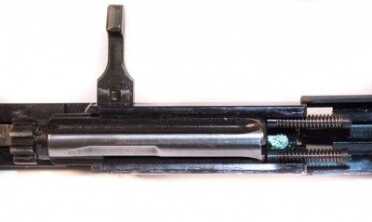
Dual extractor springs mean ambidextrous functionality is already present. Just switch it from one side to the other.
[/one_half]
[one_half_last]
[/one_half_last]
[one_half]
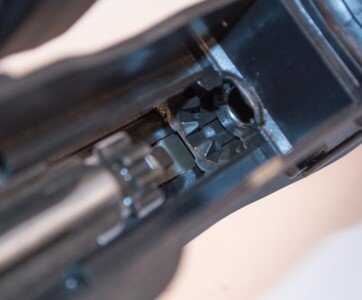
With most rifles, the barrel extension is difficult to reach and clean. With the ARX100, just remove the whole barrel.
[/one_half]
[one_half_last]
[/one_half_last]
[one_half]
[/one_half]
[one_half_last]
[/one_half_last]
[one_half]
[/one_half]
[one_half_last]
[/one_half_last]
[one_half]
[/one_half]
[one_half_last]
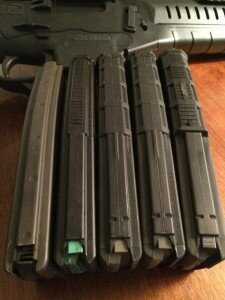
Only the Magpul Gen 3 (right) wouldn’t work. Others left to right are: Brownells, Troy Industries, Magpul PMAG 30, Magpul PMAG Gen 2.
[/one_half_last]
[one_half]
[/one_half]
[one_half_last]
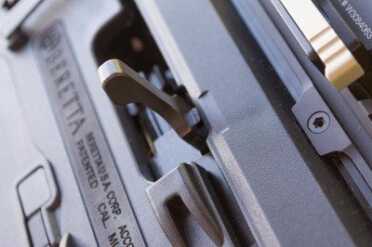
The bolt handle is smaller by necessity. I imagine aftermarket companies will offer enlarged covers that can be removed for maintenance.
[/one_half_last]
[one_half]
[/one_half]
[one_half_last]
[/one_half_last]
[one_half]
[/one_half]
[one_half_last]
[/one_half_last]
[one_half]
[/one_half]
[one_half_last]
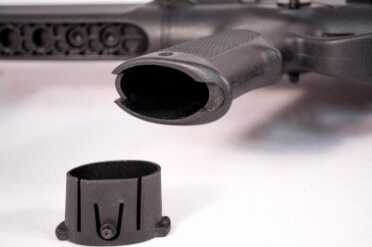
The grip offers a storage area. The bottom secures with a spring snap, but is easy to open using, you guessed it, a bullet tip.
[/one_half_last]

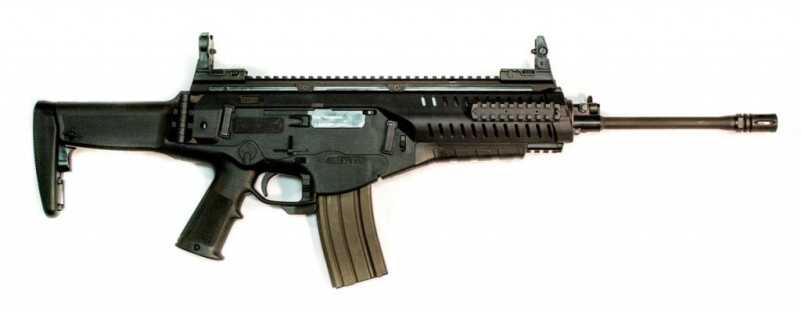
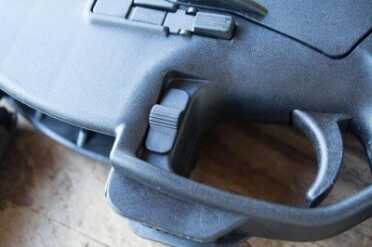
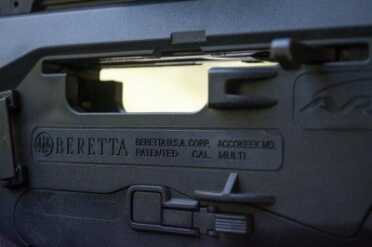
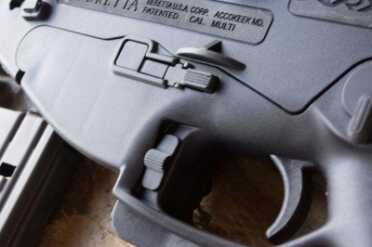
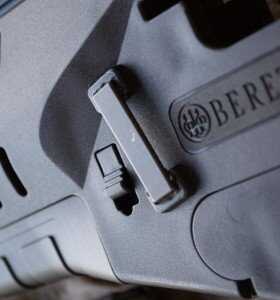
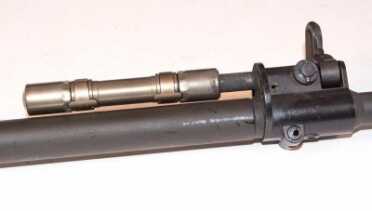
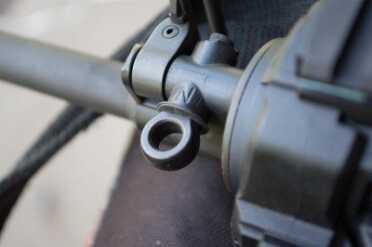
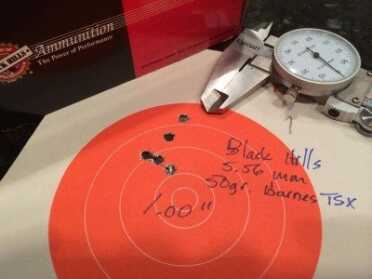
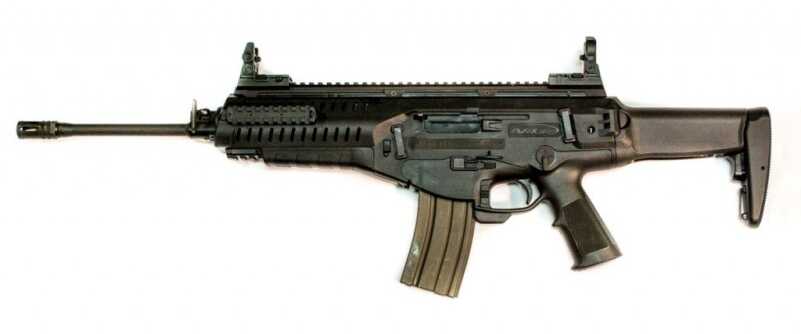
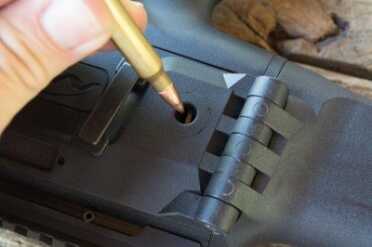
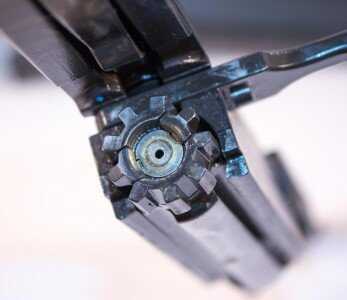
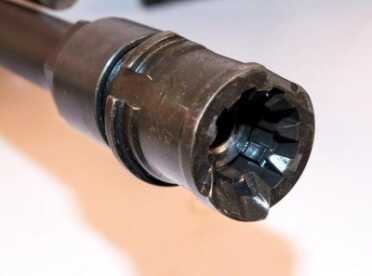
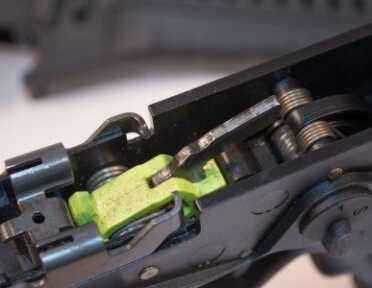
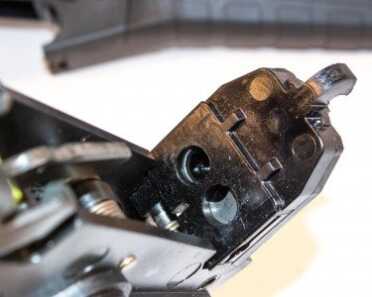
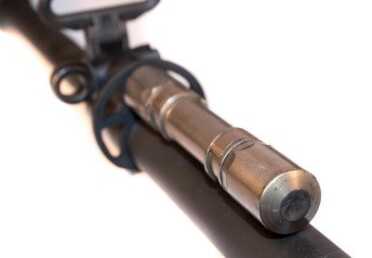
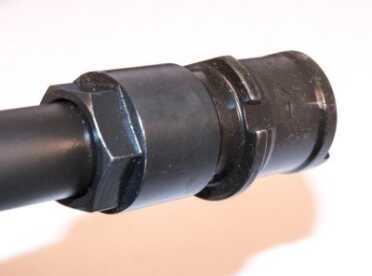
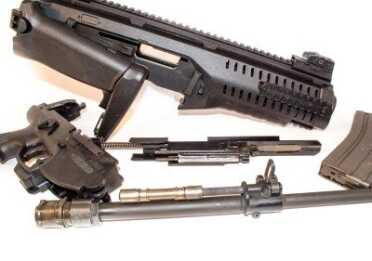
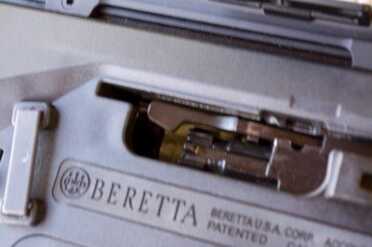
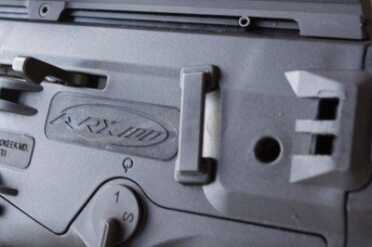
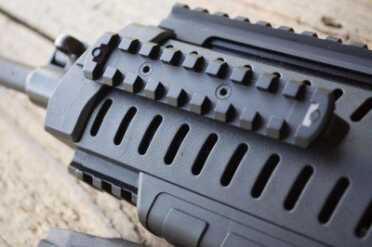
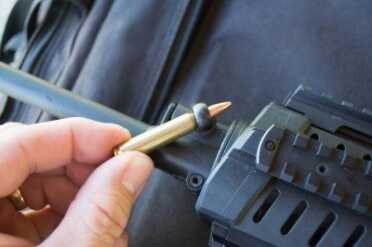
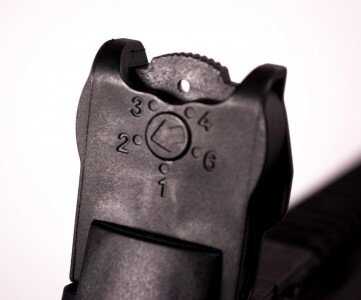
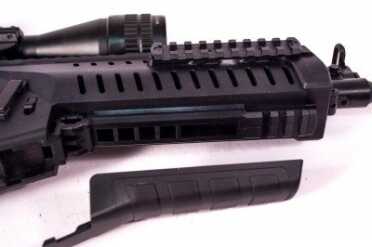
I also have a arx100 the only problem is the stock is a little short.Baretta does not have any plains on making it larger. Anny advice on making it. More comfortable?
maybe I will test this one out
Still wondering
They lost me at the rifle grip. I very much dislike the A2 style AR grip. The first thing I’ve done on ANY AR I’ve owned or built was to swap out the grip to something different. Did the same thing on my SCAR, I custom fit an aftermarket grip. Hell, I do the same thing on my AK’s. I wouldn’t buy this simply because I loose that flexibility.
About two minutes with a detail sander or Dremel and I could have those P mags working perfectly in that weapon. And they would probably still function in an AR15.
They almost certainly would work – it’s just the over-insertion stop on the PMags that’s getting in the way 🙂
“Since the rifle is piston operated, there’s no buffer tube in the way of pistol operation.”
Gas piston operation does not, by itself, do away with the need for a buffer and buffer spring. Neither does a direct impingement system require them. Almost all piston-driven ARs have buffer assemblies. And all direct-impingement systems could have been designed with the recoil system of this Beretta – a guide rod and recoil spring (as can be seen in the “field stripped” photo). Beretta’s decision to use a guide rod and recoil spring permitted them to allow the gun’s operation when folding the stock, but that decision is not related to the piston system. A direct-impingement system along with a guide rod and recoil spring would likewise have allowed the gun’s operation with a folded stock.
You are correct, I’m simply using an illustration that most AR shooters will instantly relate to – no buffer tube sticking out the back that prevent use of a folding stock.
Can it operate in WET conditions? Concerned with jams with gas design? 6.8 SPC or 7.62 x 39, now your talking; especially, with a short barrel. Bring one down to the 4/2 in Little Creek, VA; we’d like to put it through the rigors of CQB!
I was super excited to get my hands on one. I quickly learned the gun is all looks and no performance. I think an aftermarket trigger would go a long way. I think the biggest downside is its price point. For that kind of money, one would expect better performance than something like a bottom of the barrel AR or Mini-14, but thats exactly what your getting. My hope is that if it doesn’t die in the market place, then maybe some company will come along and make some aftermarket remedies.
Any true battle rifle is going to show less accuracy in favor of reliability, and they favor a heavy trigger because people walk around with guns pointed at each others backs. Of course there will be aftermarket remedies for use in non-battle conditions.
If you define “performance” as only accuracy and trigger of this gun, you would be right. But no bottom level AR or mini-14 comes anywhere close to the design features of this gun that make it suitable for LE or military use among a wide variety of shooters. Nor do those other cheaper options allow for things like field replaceable barrels, etc etc. That’s the whole point of this gun – modularity and reconfiguration without need for tools. That’s what you’re paying for. If you don’t need those features, then go with the base level AR or Mini-14.
I have a Beretta C4X, and the trigger pull is long. How long is it??? Sometimes I take a coffee break in the middle of firing a round.
So how is the trigger pull (besides the 8.5 pounds which is pretty bad) on the ARX100? Can it be adjusted to a reasonable 3-4 pounds??
Thanks
Howard2374
Good review, but unless I missed it, there is any mention of how this gun handles recoil. How did it like double tap and rapid fire? It’s an interesting gun that looks like a Scar16s and is in the same price range. It’s a little lighter and has some other cool features. I’d like to hear the reviewer’s thoughts on the comparison. While I’m tempted, I wouldn’t buy one right away.
Looks like a quick remedy for a FNH Scar. Not going to happen. I love those sights and much, much more! LOL!!!!